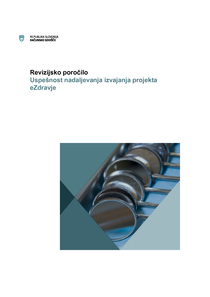The Court of Audit of the Republic of Slovenia audited operations of the Ministry of Health already in 2013, when it expressed the opinion that eHealth project management was ineffective. Due to existing problems in implementing eHealth project, the Court of Audit decided to carry out a follow-up audit in order to review effectiveness of the project implementation. This audit covered the period from 20 March 2014 to 31 December 2016 and examined operations of the Ministry as well as the National Institute of Public Health that took over the project during the period covered by the audit.
Until 1 December 2015, by the date when the Ministry was responsible for the implementation of the eHealth project, 20 IT solutions were set up. Among others: IT solution eRecept for issuing e‑prescriptions for medicines; IT solution eNaročanje for electronic scheduling, making specialist healthcare appointments and keeping waiting lists; Central Register of data on patients and web portal for insured persons zVem. Furthermore, the Ministry set up a private healthcare network zNet and server infrastructure that supports IT solutions of eHealth project.
The Ministry altered eHealth project several times since it was established in 2009, i.e. in terms of content and technically, without justifying its decisions by using a cost-benefit analysis, projections of number of users and an assessment of financial consequences.
Even though the Ministry set up planned IT solutions and other results of eHealth project, it failed to provide all solutions to be applied. When it handed over results of the project to the Institute, only four IT solutions were fully applied, while healthcare service providers tried to speed up the applicability of one IT solution, as the rest of IT solutions were not applied or had limited applicability. Only in September 2015 the Ministry defined final dates for the application of IT solutions of eHealth project, but healthcare service providers did not follow those deadlines.
The Ministry's statements concerning eHealth project status did not reflect the actual situation, since the Ministry in brochures and on its website presented some IT solutions of eHealth project as fully operational, on the contrary, they were not applied or their applicability was only partial.
The Ministry handed over the results of eHealth project to the Institute on 1 December 2015. By the end of December 2016, seven IT solutions were fully applied, ten IT solutions had limited applicability and three IT solutions were not applied.
The Institute made substantial efforts to promote applicability and made evident progress. In December 2016 there were 85 percent of all prescriptions issued by using IT solution eRecept. IT solution Telekap offered support to doctors who treated more than 1,500 patients at a distance.
According to the assessment of the Court of Audit the Ministry was ineffective in meeting the objectives of eHealth project in terms of content and timetable. The Institute was partially effective in achieving the conceptual objectives of eHealth project, while it was ineffective in realising the schedule.
During the audit, however after the period covered by the audit, also other steps were taken. Namely, from the beginning of the year 2017 the public was able to access the web portal zVem, in addition thereto also electronic register on vaccinations eRCO was used more widely. The Institute improved the input mask of the website eNaročanje in April 2017 and developed instructions for the users. The Institute promoted application of the Central Register of data on patients among the healthcare service providers. In January 2017, the Ministry requested all healthcare service providers to immediately make the necessary arrangements for applying IT solution for scheduling at eNročanje. In September 2017, the Institute developed a conceptual plan and timetable of activities for full applicability of all IT solutions under eHealth project.
The Court of Audit did not demand from the Ministry and the Institute to submit their response reports, since they remedied disclosed ineffectiveness or adopted appropriate corrective measures already during the audit process, if possible. The Court of Audit issued several recommendations to the Ministry and the Institute.


